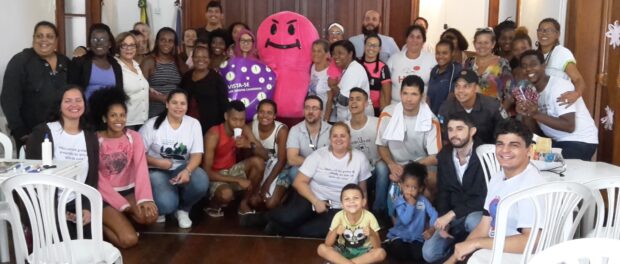
On June 8, members of Rio de Janeiro’s medical community and residents of the Morro dos Prazeres favela in Central Rio joined to combat human papillomavirus (HPV) and promote healthy sexual behavior in an all-day event in the local Casarão dos Prazeres community center.
Local doctors and nurses and a group of pharmaceutical and nursing students from Uniabeu—the new name of the Brazilian Association of University Education (ABEU)—volunteered to bring a series of activities designed to raise awareness of the importance of prevention, testing, and vaccination for HPV and other sexually transmitted infections. The activities targeted adults and teenagers—while some oral health activities were offered for a group of children—making use of everything from games and competitions to real-life scenarios imagined by the participants. All activities were guided by cues and occasional explanations from the volunteers.
The event was organized as part of the eighth annual Brazilian Symposium on HPV as the community outreach portion of the otherwise more academic symposium. Professor Dennis de Carvalho Ferreira (of Uniabeu, Estácio de Sá University, and UVA) coordinated the event with community activist Cris dos Prazeres of the local Prazeres health organization Prevention Realized with Organization and Love (PROA).
According to a 2017 preliminary study by the Ministry of Health, an estimated 54.5% of the population between ages sixteen and twenty-five in Rio de Janeiro city is infected with HPV. Although the symptoms of many strands can be treatable, the virus itself has no known cure. There are four strands prominent in Brazil that can lead to cancer in both men and women. This, along with the highly contagious nature of the virus, have made it a priority for health officials across the country. As such, the Ministry of Health continues to expand its vaccination campaign and, as in Prazeres, groups of health professionals and community leaders are working to spread awareness and encourage vaccination and safe sex practices.
As a testament to the event’s success, the symposium’s outreach project was asked back to Prazeres after previous years’ events in the community had consistently high attendance. During the event, many residents eagerly shared their thoughts and opinions. “If we don’t have love for our own body,” one participant commented, “imagine for the other’s,” emphasizing that a healthy relationship starts with healthy individual habits. A common concern among residents was that, as one in attendance said, “We see a pretty face and think that’s all there is,” and neglect the conversation about STIs with partners. Aside from solely providing information or prescribing general medical advice, the event encouraged those present to contextualize healthy sexual habits within their own lives and local reality, explaining in their own words and personalizing what would otherwise seem like extreme scenarios.
For the symposium, the community event serves as an important part of the exchange of knowledge in the same way that research presentations serve to spread findings among academics. One of the strengths of the event is trading understandings with “those that have different knowledge,” explained Niterói-based public health physician and event volunteer Fábia Lisboa de Souza. While academia may possess more data and doctors more medical experience, residents understand “how to make the changes” in their lives and communities. She cited the celebrated Brazilian educator Paulo Freire in describing the horizontal relationship she seeks with community residents that leaves both sides wiser and more open to new ideas. As Dennis de Carvalho added, “if there’s no exchange, there’s no point.”


